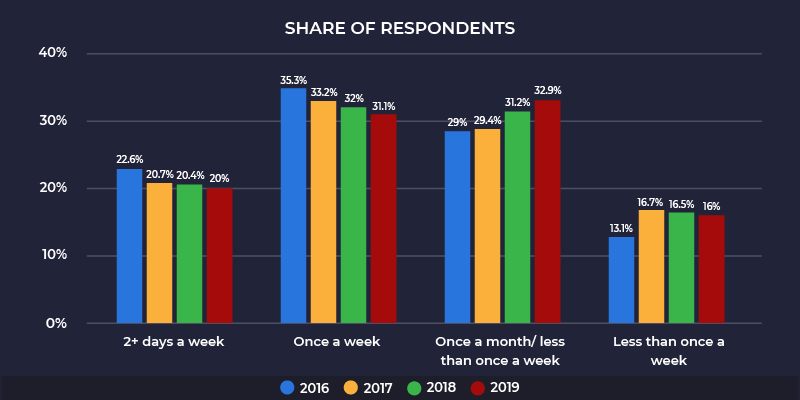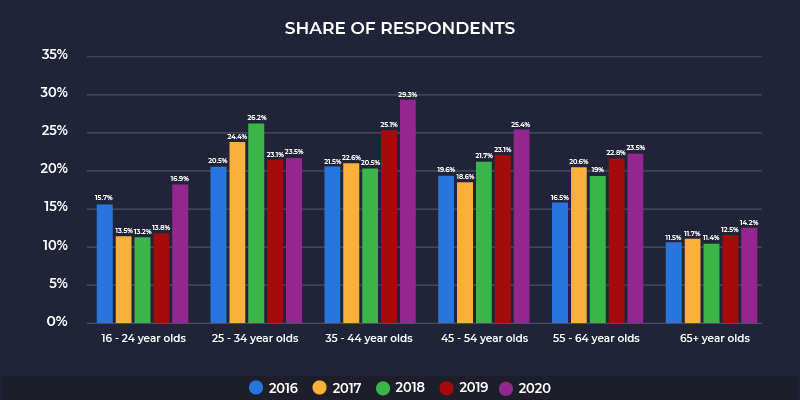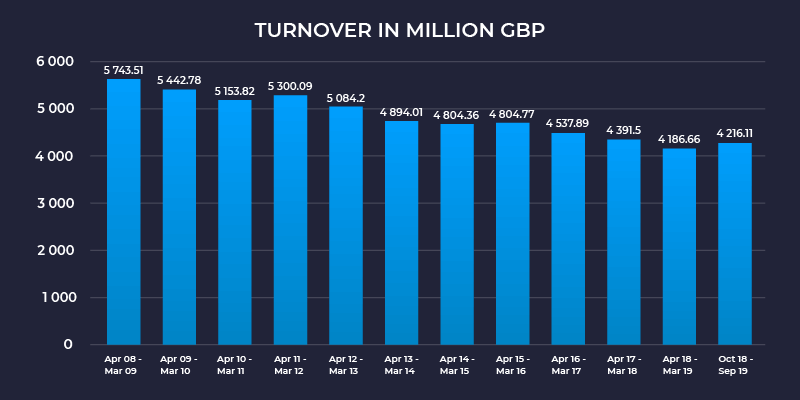British Gambling Trends: Analysis of the Past Decade
KingCasinoBonus receives money from casino operators every time someone clicks on our links, influencing product placement. The compensation we receive does not impact our recommendation, advice, reviews and analysis in any way. Our content will always remain objective, independent, straightforward, and free from bias.

The impressive growth of the betting and gambling UK sectors is undeniable. The team of casino professionals from KingCasinoBonus has been looking at it and its preeminent phenomena intently. This post will walk you through the significant changes that happened from 2010 to 2020 and what the market specialists predict for the future.
Read further to gain access to these topics:
On this page
UK Gambling GGY shifts: 2010 to now
Great Britain is one of the countries that witnessed a steady increase in gambling companies’ profits in the last decade, even considering the United Kingdom Gambling Commission’s strict regulations.
We have seen and analyzed statistics that sustain this argument, but one clear cut example comes from Statista.

Statistics explained:
Compared with the spring months of 2010 and 2011, the latest complete calculations available, in the autumn months of 2019, show almost a doubling of the Gross Gambling Yield.
What are the latest numbers?
The UK market is close to reaching 14,5 billion GBP. The number is staggering by itself, but the government thinks of ways to invest the 15% tax paid by the casino operators. Even in this constantly increasing environment, the latest sums have shown a slight increase, 0.6% to be precise.
What about the future?
On the international spectrum, online gambling’s value is seen to keep growing in the following years, starting in 2021. From 58,9 billion USD in 2019, economy experts and investors proclaim a rise to almost double that amount, namely to 92, 2 billion USD or even higher.
Considering the valuable role of tax money plays in key state sectors, lotteries, bookmakers, as well as brick-and-mortar and online casinos are monitored by financial specialists and data/market analysts thoroughly.
We will come back to the topic of market prediction later on the page when we delve deeper into the role of portable devices in gambling and bookmaking.
UK betting: a strong market component

UK bets have grown more significant from track-related races. Now it can relate to elections, referendums, or worldly-minded events. Its strength reflects, among other things, in the number of employees that it creates.
In 2019, around 46,000 Brits were working in this domain or those closely related to it. To make a distinction by which luck-base enterprise they work on, casinos and arcades usually require a more significant number of minimal employees. At the same time, lotteries can function with less a dozen quite comfortably.
Curious to know more about the biggest operators?
You are probably already aware of the biggest names in the game. According to Statista, the biggest number of betting shops are operated by:
- William Hill;
- Ladbrokes;
- Gala Coral Group;
- Betfred.
Based on the assessed number of shops over time, the leader William Hill kept its branches consistently at almost 2300. The same conservative trend was witnessed for the shops owned by Gala Coral.
On the opposite trend, Ladbrokes minimized the number of physical points from 2009 to 2019 with a couple of hundred since the survey’s beginning.
Do you know which company grew in the last decade?
Starting from 2009, in ten years, Betfred managed to double its number of physical betting shops around the country. To compare the actual numbers, the over 800 shops at the start of this period have doubled to over 1600.
Of course, our observations only concern some of the biggest names, but other companies are strong contenders too. They have contributed to the boom we have talked about.
British frequency of betting
Obviously, the number of betting shops that have exponentially grown over the years is sustained by regular folks’ constant betting.
The last five years have shown an absolute consistency on the part of Brits. Most survey respondents have gambled once a month before completing the interviews if not more than that (up to two times a week).
A short year-by-year comparison
In 2016, the consensus was that gambling or betting once a week was a common choice. The next year in 2017, this activity was reduced to once a month by the majority, by a short margin. However, the next chunk of time, in 2018, the trend came back to once every 7 days. Lately, the options have been divided, with only over 28% preferring a once-a-week timeframe dedicated to betting.
British frequency of casino gambling
Casino games are amongst the most common ways of spending time, along with the bets we have just discussed. The numbers are entirely tied together when it comes to this aspect. Still, the baseline is that a part of the interviewed individuals gambles every month, at least one time.

Statistics explained:
As commonly expected, the mentioned chart’s extremities present lower percentages than the middle ground options. Thus, very frequent visits to online and offline casinos, namely twice a week or more, are valid for 22% of people or less. Oppositely, one casino visit per month is at the lowest rate, proving that gamblers are usually keen on their interests.
The rest of the options compete at the same levels, around 30% to 35%. We can safely conclude that the past decade has set British people’s trend to gamble once a week at most, or alternatively, more than once a month.
Interesting fact: The top preferences in terms of the game thematic are lottery and bingo raffles, followed closely by fruity machines and arcades. Bingo opportunities are numerous, but we have uncovered and tested the best bingo sites of 2025 for your leisure.
Online gambling numbers
This section is aimed at dismantling the rumour that only youngsters use Internet services for gaming. In fact, the most active group of online gamblers in the last decade covers middle-aged adults.
Again, the graph that we will show below shows the age of extremities as the lowest variants. From our perspective, the numbers are perfectly explainable since the teens are not very engaged in the sort of activity than adults. On the other hand, older folks are not so engaged with modern technology and still prefer offline options.

Statistics explained:
We want to take every age group and their performance across the latest years and give several comments upon them. In the 25 to 34-year-old section, the last years have shown a general tendency for online gambling usage to increase along with age.
On the same patter, the people aged 35 to 44 behave similarly, progressively gaming more with their age. Here, experts have noted the highest peak of the chart in 2019. From that age limit onwards, online gambling has somewhat decreased in the latest years, but the differences are not noticeable. 2019 kept its number 1 top title.
When it comes to the last group, they have shown constant progress between 2016 to the present time. From our other research, we have also uncovered that folks between 45 and 65 also have the highest spending on online wagers.
Technology advancement: the turning point of the decade

Undoubtedly, the significant advances in user-friendly, and price accessible technologies from laptops to smartphones has had a major role in the Renaissance of UK betting. In 2012, at the beginning of the past decade, online gambling grew internationally, with 80% compared with just four years before 2008.
This boom did not fade away quickly. Instead, it went up to over 41 billion USD.
The role of mobile adaptive sites and apps
Once casinos have seen the amazing potential that play-on-device has, they have invested in this side so much that nowadays, placing a bet on a Blackjack table or a jackpot slot is just as easy as ordering food or doing online clothing shopping.
In 2012, the industry’s mobile gaming boomed in the same fashion as the other mentioned aspects. As compared to the 2000s, it increased by 75%. At the time, the predictions were optimistic for the rise to continue. Even those expectations were exceeded in the middle of the last decade. In 2015, mobile sites and apps doubled in novelties and usage.
Across the globe, mobile bets have gone past 70 billion GBP in the last ten years. This stunning number includes all the major game categories, national and local lotteries, online casinos, and sports betting.
Over 40% of the gaming industry takes place on mobile phones and tablets. This also means that almost half of gamers are strictly bound to their tablets and phones. Our primary research leads up to testing and rating mobile casinos, along with their available promotions.
To respond to this commodity that was bound to take over, betting shops that have been a staple in the countries came up with their sites and apps. In such a way, they preserved their brand while adapting to the trend.
Novelties derived from trends
Of course, a new type of gaming opportunity has to be matched with an appropriate marketing scheme. Thus, new apps and sites have created new types of betting available. We would like to illustrate them in the next lines.
Example 1: Punters can now make bets on events related to what happens outside the racetrack or the field. Some betting shops allow you to predict who is going to coach your favourite teams, or who is going to win the next local on international elections.
Example 2: Punters were allowed to make a bet regarding the conclusion of a match or tournament. Nowadays, you can make a bet and cash it out before the final minutes of the match. You can also make bets on sets of tennis, rounds of a contact sport, etc. These would not have been possible on classic slips. These are called live betting.
Our advice: Live betting is much more volatile than the other options. If you are just a starting punter, we recommend you stay away from high-risk bets, so you can keep your finances safe.
A short technology-influenced timeline
The evident rise in technology was put in motion at the start of the last decade, bringing changes in the GGY and other money-related sums.
2013-2014
Before 2013, online gaming via laptop or mobile phones was summed at around 700 million GBP. During the following year, it rose to over 1,2 billion GBP. This was also when Apple was leading the market with its competent new iPhone models and Mac laptops with long battery life.
2014-2015
This is the year that reshaped the UK industry following the official publishing of the Gambling Act. Even so, the upwards trend resulted in double the original sum, 2,4 billion GBP to be precise.
2015-2018
Nothing major changed in the course of these three years, as markets and clients were getting adjusted to the rules imposed by the UKGC. The profits grew without interruption towards an average of 5 billion GBP.
2018-2019
The end of the decade was not marked significantly by any type of change, legislative or otherwise. The rise of the profits was still on an upwards incline, but not so steeply.
Interesting fact: Counting in the fluctuation in inflation and general income withing a standard household, both the prices associated with gambling service and the average spending on them decreased slightly from the 90s, following the glorious expansion of the market.
Further facts from device usage
Mobile sites and apps had a similar international path as they did locally in the last ten years. Tech companies and blogs state that over 160 million people use their phones to place their bets worldwide. We project that these numbers will not be stagnant, as other markers like the US and India are slowly legally allowing remote betting.
Half of the current online gambling market is set and lives through apps. Knowing the stats related to specialized casino apps, we believe that this number will get bigger too.
According to the UKGC, the device play’s impact was one of the factors that built upon the 10,1% rise of the remote gambling GGY which we have witnessed around the end of 2014, towards 2015.
Interesting fact: The top casino preferences are identical for all English-speaking countries, with slots, bingo, and table games topping the podium. These predispositions are kept for mobile play as well.
Bets that have decreased in popularity
During our research, we stumbled upon the curious case of horse racing. It is amongst the few betting opportunities that have a downward trend, continuous over the last ten years.

The most important conclusion that we have extracted following the analysis of the graph above is that the last decade ended up in a 1,4 billion GBP decrease in the total profits for races, tournaments, and related bets. In the final leg of the previous decade, the turnover decreased to around 4,2 billion GBP.
As expected, the on-track cash flow from bets to tickets decreased each year slightly, as remote betting on the topic continued to grow.
What the last 10 years have shown us

Without a doubt, the years between 2010 and 2020 have shown us great growth in the UK online gambling industry. The main reason were the regulations of the UKGC, the evolution of devices, the expansion of the market, and lastly, the preferences that UK gamblers have for certain activities of the type.
Cited sources
- Size of the online gambling market in 2019 to 2023 – Statista
- Number of employees in the gambling industry in the United Kingdom from 2009 to 2019, by sector – Statista
- Number of betting shops in the United Kingdom from 2009 to 2019, by operator – Statista
- Frequency of betting as a gambling activity in the United Kingdom (UK) from 2016 to 2019 – Statista
- How Technology Has Influenced the Gambling and Casino Industry – Image Holders
- Gambling spend down since 2008 on average – Full Fact
- Gambling (Licensing and Advertising) Act 2014 – legislation.gov.uk
- How Technology Has Changed the Gambling Industry? – TMCnet
- UK Online Gambling Industry Growth Over the Years – TMCnet